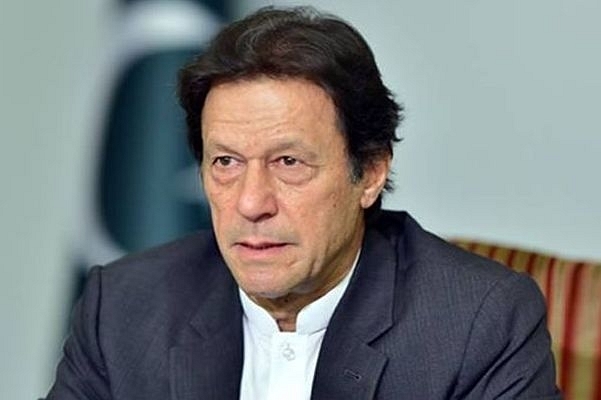
FATF Asia Pacific Group Lashes Out At Pakistan, Criticises It For Only “Superficial Actions” On Terror Groups
While overtly appearing to adhere to the Financial Action Task Force (FATF) directives to crack down on United Nations (UN) proscribed terror groups, Pakistan has been quietly un-freezing their accounts and not providing any information about what it is doing to ensure that the money does not go back into terrorist funding.
It was stated in the Asia Pacific Group’s (APG) report released on Sunday (6 October) ahead of the FATF's plenary that blows the cover of Pakistan's claim of being serious about tackling terror.
Under the header 'Actions taken pursuant to United Nations Security Council Resolution (UNSCR) 1373 (terror) proscribed individual and entities', the APG report states, "Pakistan did not take any actions to freeze the accounts of proscribed organisations during the period under review, with the exception of assets frozen for proscribed organisations that are also listed under UNSC Resolution 1267.
"Since 2016 (Pakistan only commenced record keeping on freezing of accounts for proscribed individuals in September 2016), 4,770 banks accounts have been frozen with a value of 43.21 million Pakistani Rupee (PKR) (US $320,074), and 1,441 Micro Finance Bank accounts totalling 1.95 million Pakistani Rupee (US $14,444).
"However, detailed statistics on year of freezing action were not provided and it is not clear which terrorist groups the accounts frozen were associated with. Furthermore, the assessment team understands that proscribed individuals are regularly de-listed and their accounts unfrozen.
"Pakistan did not provide any information on the value of unfreezing actions or what measures were put in place to ensure that these unfrozen funds were not made available for terrorist purposes once removed from the 4th Schedule. No other financial institution or designated non-financial businesses and professions (DNFBP) has frozen funds pursuant to UNSCR 1373."
Moreover Pakistan did not provide details of when financial institutions or DNFBPs declined to entertain proscribed individuals or entities, as per the report.
"Pakistan did however mention that over 600 suspicious transaction reports where filed by reporting entities upon refusal of financial services to proscribed individuals or entities. However, Pakistan provided no additional information on the financial monitoring units' use of these suspicious transaction reports or actions taken by law enforcement agencies, nor an explanation of why this total (600) significantly exceeds the 198 suspicious transaction reports disseminated as terrorism/terrorist financing by the financial intelligence unit of the Federal Investigation Agency (FIA)."
The report highlights more brazenness by Pakistan.
"Despite the ongoing high-profile operations of multiple UN-listed individuals and organisations inside of Pakistan, Pakistan reported it received zero requests, and there are no examples of approving or licensing the use of assets or financial services in accordance with UNSCR 1452 (concerns Al Qaeda, the Taliban and terrorism), which calls into question whether Pakistan is fully implementing UNSCR 1267 and its successor resolutions," it asks pertinently.
Under the head, criminal confiscation related to terrorism and terrorist financing, it says that in addition to funds frozen under Pakistan's targeted financial sanctions regime, in Pakistan's 58 convictions for terrorist financing offences, 14.46 million Pakistani Rupee (US $107,111) has been confiscated. "However, it is unclear if the confiscation amounts reflect the value receipted by the state or orders stipulated by the court, and the value of seizures by law enforcement agencies was not provided."
Pakistan indicated that the FIA seized the following items in their terrorist financing cases. No further information was provided on these seizures, "45 properties located in Karachi worth of 3.5 billion Pakistani Rupee seized in money laundering and terrorist financing cases; All bank accounts used for Terror Financing (TF) in terrorist attacks in foreign jurisdictions are seized and exhibited in court; gas station located has been seized."
Under the head, "Consistency of actions taken pursuant to UNSCR 1267 with Pakistan's terrorist financing risk profile", it says that while banks have undertaken some freezing actions, overall, the value and number of accounts frozen is not fully consistent with Pakistan's TF risk profile, particularly in recent years.
"Furthermore, the level of screening and absence of freezing actions in all non-bank FIs and DNFBPs is not consistent with Pakistan's terrorist financing risk profile."
It says that recent actions by Pakistan to take control of Hafiz Saeed's Jamat-ud-Dawah (JuD) and Falah-i-Insaniat (FIF) Foundation property "are positive steps to address some of Pakistan's key terrorist financing risks. However, Pakistan did not demonstrate to the assessment team that it has established effective asset management of this frozen property".
"Furthermore, Pakistan did not demonstrate that these actions are supporting broader counter-terrorism/counter-financing of terrorism strategy. For example, Pakistan provided no information on the prosecution of individuals and entities associated with the frozen property relating to TF, and continued freezing actions against JuD, FIF and other regional terrorist networks," it says.
(With inputs from IANS)